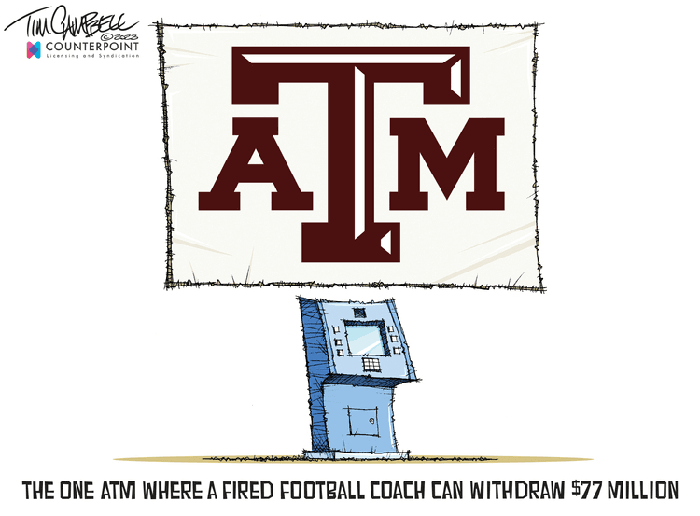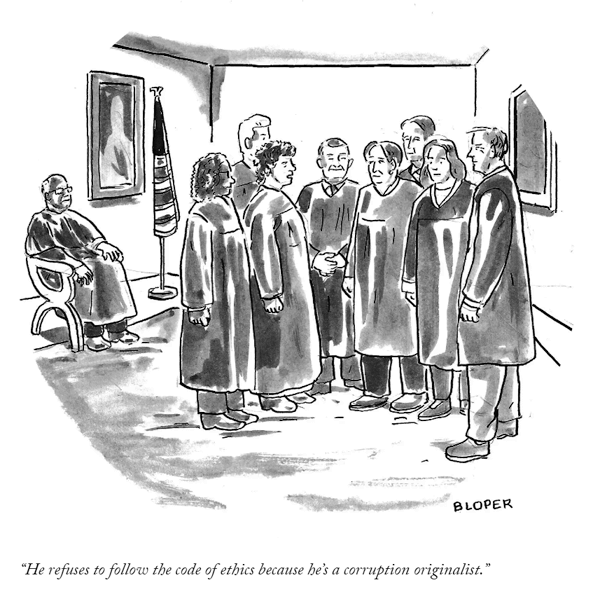
Graeme MacKay starts us off with something light: Canada has released its new money, with Charlie instead of Liz. You can argue with the kid who doesn’t know who King Charles III is, but MacKay is right that the relationship is somewhat vague and doesn’t come up very often.
IIRC, the monarch still has to rubber-stamp a few things, like the appointment of the Governor General, who is in charge of rubber-stamping things on this side of the ocean and cutting ribbons at new shopping centers. Or something.
When a Royal comes visiting, however, much of Canada gets very excited, so I suppose it still matters, at least outside of Quebec.

In any case, the younger kid is right that we’re near a point where nobody carries coins anymore, and, as you can see here, there’s a good reason in Canada because their coins are huge. This is a Canadian dollar, which is worth 73 cents American at the moment.
They call their dollar coin a loony because it has a picture of a loon on one side, and some kind of a duck on the other.
That hasn’t changed.

Keith Knight offers another bit of comical commentary.
The saving grace for Friends was that, as with Seinfeld, the characters were not particularly likeable, or, at least, they shouldn’t have been. Seinfeld ended in a satire of No Exit, in which they’re all killed in a plane crash and sentenced to the Hell of each other’s company, but if the writers at Friends disliked their self-absorbed bougie characters, they never said so.
But being excluded from their inner circle is not such a bad thing and I got a laugh out of this one.

Still on the topic of WGASA, Tim Campbell (Counterpoint) is one of several commentators who have expressed wonderment over the monster settlement offered to fired Texas A&M coach Jimbo Fisher.
Shouldn’t they, instead, give that money to the professors?
Well, did you ever watch Sunrise Semester? It was on in the mornings from 1957 to 1982 and, if you want to watch a professor do his thing, here’s your chance! But I don’t think you’ll find yourself one of 8.33 million people glued to the set.
So don’t expect the networks to offer big bucks for the broadcast rights, or for 100,000 people to buy tickets to watch live or for jerseys with the professor’s name on the back.
I’m not defending the system. I’m just defending logic. Commentators who say the school should have spent those dollars on something else are missing a pretty central point: The money exists because of the football program.
On to more weighty matters.
Juxtaposition of the Day


Great minds. Bennett gives us a friendly-looking dog who is on a leash with nobody holding on to the other end, while Granlund suggests a pooch with the right attitude but no teeth. They’re both right, in that it looks good to have an ethics policy but, as seen in Bennett’s example, there’s no real enforcement agency, while, in Granlund’s, there isn’t even a lot of compelling language — a list of suggestions rather than rules.
I heard someone on NPR yesterday suggest that justices from a layer below SCOTUS could examine situations and render opinions, but even he said it would only be opinions, not rulings. In other words, they could say “Tsk tsk” but they couldn’t make anything happen.

Brendan Loper suggests that Justice Thomas would insist that, unless you found something in the Founders’ notes about motor homes and airplane rides, you couldn’t devise a code of ethics that would prevent justices from accepting them.

While Ann Telnaes cuts to the chase and points out that Alito and Thomas, whose acceptance of major gifts touched off this entire scandal, aren’t likely to suddenly change into steadfast champions of ethical behavior because of a piece of paper urging them to.
It’s frustrating because the true boundaries are not hard to figure out. As a reporter, I wasn’t supposed to accept anything from a source, or even a potential source, but it came down to common sense: You could let them buy you a soft drink, but not a meal.
Or, y’know, a quarter-million-dollar motor home.

Clay Jones commented on Trump’s recent use of the term “vermin,” commonly associated with Hitler and Mussolini in their rise to power, as well as his announcement planning to prosecute and jail dissenters if he is elected president in 2024.

It’s not as if Jones is the only journalist who noticed the parallel, but, nonetheless, TikTok took his cartoon down as hate speech and turned away his appeal of their decision.
There seems to be a lot of that going around these days.

As Darrin Bell (KFS) suggests, there is a certain group — and certainly a prime audience for TikTok — who are so determined to only back a perfect candidate that they don’t mind running the risk of a fascist takeover which would certainly target them early on in the game.
Perhaps they think that if they don’t vote, it won’t happen to them. Or they may be counting on Dr. Jill Stein to win and fix everything.

But pay attention, because, as Bill Bramhall points out, it’s not just the kids in knit hats and high tops who are obsessing over trivia and irrelevancies while the threat of an authoritarian takeover is staring them in the face.

I put this meme together a few years ago, because my reading of history showed that, while not all Germans were Nazis, there were a great many people who simply ignored what was going on around them, not simply at the start when the takeover was happening, but throughout the war.
I used to post it from time to time when it seemed relevant, but over the past year or two, it’s gotten taken down on social media, like Jones’s cartoon, because it goes against community standards.
Perhaps it does.

Nick Anderson is right, that Trump’s loyal disciples will defend him, no matter what he says, and because they don’t disagree with his outrageous statements.

Another of my oft-posted memes, this an excerpt from an interview I did nearly 40 years ago, that seems prophetic and terrifying now.
A third of American adults don’t even bother to vote.

Mike, you wrote, “while not all Germans were Nazis, there were a great many people who simply ignored what was going on around them,”
I reply: While that is true, it is not the whole story. It is only 2/3 of it. There were also many who did what they could to resist and stop the madness. Many paid with their lives.
Not all Israelis are monsters (many are decent Jews) Not all palestinians are hamas monsters (many want peaceful existence for all). Not all u.s. citizens support the endless wars mandated by our ‘military industrial political’ complex. Eisenhower warned us.
I cannot condone the nazi evil. I cannot condone the hamas evil. I cannot condone the Israeli government evil. I cannot condone the united states wringing of hands saying, ‘oh, please stop’ while, at the same time, shipping mass weaponry to Israel to slaughter people.
I have little power over it. But, I am literally sickened by the soulless, murderousness of those ruling human society.
shermanj – You sound like the type of person who SHOULD run for high office, but (understandably) WON’T. Can’t blame you as you understand your place: anyone who wants to be a high-level politician is really the least qualified. Their only motivation is to make it a career, so votes not public benefiting policy is paramount. You want what’s best for the people, which only sounds like a winning strategy, but history proves otherwise (a’hem, bernie sanders).
I believe there is an answer, but given how I just described career politicians, it would never pass. Self preservation always leads altruism – even altruism that could create the most healthy democracy.
My thought is that we treat lawmaker positions like jury duty. I could go on at length describing the benefits, but I believe most people (not career politicians) could easily determine those benefits as well: we use a jury system to adjudicate on peoples very lives, having a democratic jury system, as we have now for criminal justice, seems like a perfect way to determine something less serious like spending tax dollars.
This, shermanj, is the way good people like you could (and should) be a proper decision maker. Go shermanj!
I’ll confess that I don’t so much vote for Democrats as I vote against Republicans.
Hillary and Biden weren’t my first choice but they were 1000x preferable to Trump.
At least one of them won.
Amen. I first voted in 1971. Until 2016 I prided myself on never voting a straight party ticket under any conditions. That seems so naive to current me.
Lazarus Long (Robert A. Heinlein, Time enough for love) said that you should vote in every election. If you can’t vote for somebody, there’s usually someone you can vote against.
Just one final thought on world leaders and conflict from a fascinating comic:
https://www.existentialcomics.com/comic/520